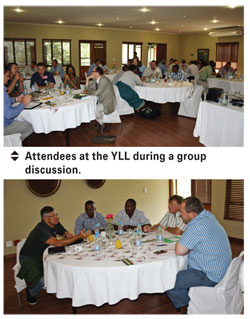March 2014
DIANA RABIE, communication consultant for Grain SA
 The third Young Leaders Laboratory (YLL) was held over two days during January 2014 in Pretoria. This is an initiative by Grain SA in partnership with the sponsor, Santam Agriculture.
The third Young Leaders Laboratory (YLL) was held over two days during January 2014 in Pretoria. This is an initiative by Grain SA in partnership with the sponsor, Santam Agriculture.
The aim is to convene the next generation of leaders in the grain industry to start building relationships and to start debating the big challenges of feeding the nation.
Attendance of the event came to 36 people of whom nine were producers (commercial and developing); six were from government departments, namely the Department of Agriculture, Fisheries and Forestry; the Department of Rural Development and Land Reform; and the Department of Trade and Industry. Other attendees were young and upcoming academics and Grain SA staff members.
Each small group was allocated an experienced mentor in the sector to guide and assist with the discussions and debate.
“The main purpose remains to build relationships between the leaders of tomorrow,” Mr Jannie de Villiers, CEO of Grain SA, said. “They need to start forming opinions around the critical issues facing the industry.”
Food security came up in almost all discussions. This flows from subjects presented such as crop insurance, strategic thinking models, agriculture in Africa and global competitiveness.
One exercise that activated extraordinary excitement and debate was the identification, rating and proposals for improvement of the building blocks of food security. Issues identified were: Food security policy; market information; infrastructure; access to land, especially communal land; access to finance; skills; regional integration; conservation agriculture practices; and profitability.
Access to land and infrastructure were seen as the biggest stumbling blocks to improve food security, whilst market information, research and the skill levels of producers were seen as big contributors.
Mr Eric Wenberg, the agricultural councillor of the USDA, also shared his experience with the group regarding projections on sub-Saharan Africa.
One of the speakers reminded the group of a quote at the entrance to the Faculty of Agriculture at the University of the Free State saying: “A nation that looks well after its agriculture is a nation that cares about its future.”
At the conclusion of the two days, some interesting observations were made:
“The most valuable aspects that I’ve experienced these past two days, are the interest in food security issues and the growing realisation of how important agriculture is for economic growth,” Dr Tom Zhuwau from the Department of Rural Development and Land Reform said.
Mr Tsikaro Mapena and Mr Johan van Huyssteen from the Grain Academy and Mr Wandile Sihlobo from Grain SA, said they appreciate the collaboration between government and different industry roleplayers. They found the YLL to be a great platform where universities, government and private companies can work together to improve and expand agriculture.
Mr Victor Mongoato, vice-chairman of Grain SA, remarked that something that had stood out for him, is the responsibility of leaders in the grain industry to find new markets for the producers’ products. According to Mongoato, the producers shouldn’t wait for the buyers to approach them; they should start being proactive in looking for new distribution outlets.
Grain SA identified the “next generation” as one of their strategic goals as an organisation for 2014. Another initiative in this regard is the Grain Academy. Grain SA in partnership with Syngenta invests in leadership training for young leader farmers. This was a winning combination right from the start and the second group commenced their training in February 2014.
Publication: March 2014
Section: Other Articles